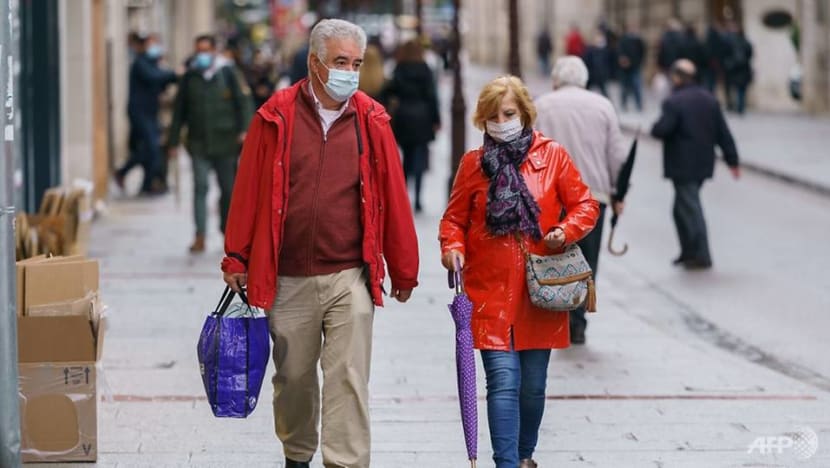Spain announces new state of emergency as COVID-19 infections soar

People wearing face masks walk in Burgos, northern Spain, on Oct 21, 2020. (Photo: AFP/Cesar Manso)
MADRID: Spanish Prime Minister Pedro Sanchez announced a new state of emergency on Sunday (Oct 25) in an effort to curb soaring coronavirus infections, imposing local nighttime curfews and banning travel between regions in some cases.
The measures go into force from Sunday night and will require all regions except the Canary Islands to impose a nighttime curfew and limit the number of people allowed to meet to six.
"We are living in an extreme situation ... it is the most serious health crisis in the last century," he told a news conference following a cabinet meeting.
Catalonia was one of the first regions on Sunday to use the new legislation to impose a curfew, which will take effect at 10pm. Establishments open to the public will have to close at 9pm.
Police were patrolling the city before the curfew took effect and locals welcomed the new rule.
"I believe that in a certain way a measure had to be taken because everything was getting a little out of control," said vocational training teacher Paula. "I think more measures will come, but it's a good start."
Other regions that announced curfews from Sunday night included Cantabria and La Rioja.
Spain imposed one of the toughest lockdowns early on in the pandemic and then relaxed curbs over the summer.
But like many other European countries it has seen a second wave hit in recent weeks, and now has one of the highest numbers of infections in Western Europe. Total cases rose to 1,046,132 on Friday, while the death toll is nearing 35,000.
READ: Spain mulls curfews to contain 'out of control' COVID-19 pandemic
The state of emergency will need parliamentary approval to last beyond 15 days. Sanchez asked for parliament to approve its extension up to May 9.
A growing number of regions had been calling on the government to implement the measure.
The Madrid region had already limited the number of people who could meet inside homes to six, as well as banning the mixing of different households overnight.
Canary Islands vice president Roman Rodriguez tweeted he was "satisfied" the tourist hotspot had been excluded from the curfews but encouraged people not to let their guard down.
The islands hope to save their tourist season after the UK and Germany decided last week they were no longer a travel risk.
READ: Spain to extend COVID-19 furlough scheme until Jan 2021
The decree will serve as a legal framework to implement a new warning system of levels, similar to the ones already applied in countries such as Germany and France.
According to the level of risk, travelling between regions could be banned if a regions decides, except for justified reasons such as working. Movement could also be restricted within regions in localised lockdowns.
Most of the regions are already above the parameters to be considered at the highest level of risk.
BOOKMARK THIS: Our comprehensive coverage of the coronavirus outbreak and its developments
Download our app or subscribe to our Telegram channel for the latest updates on the coronavirus outbreak: https://cna.asia/telegram












